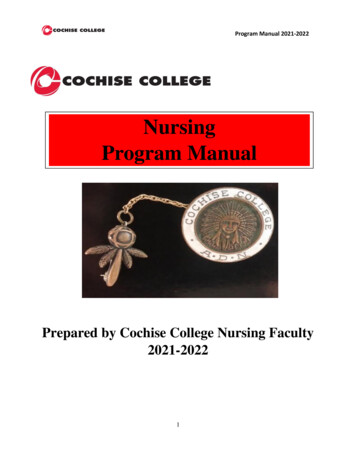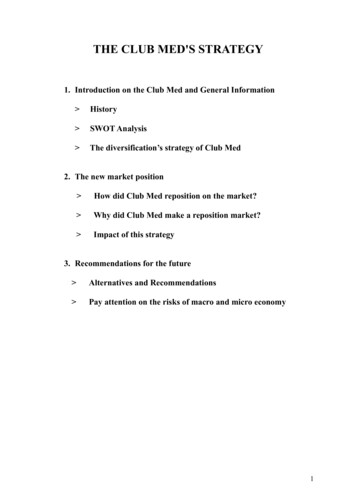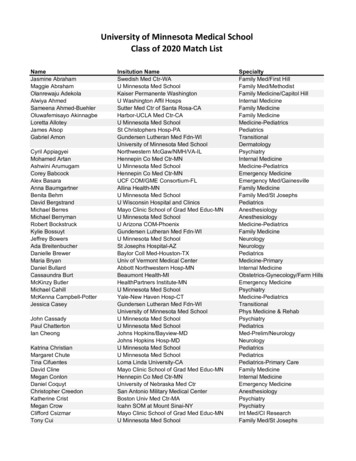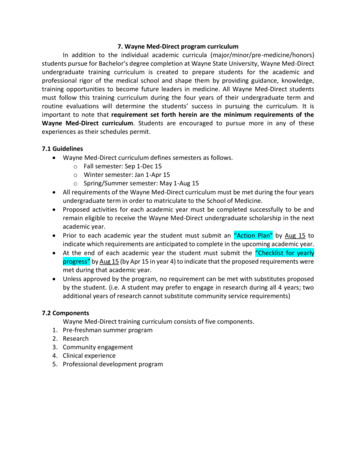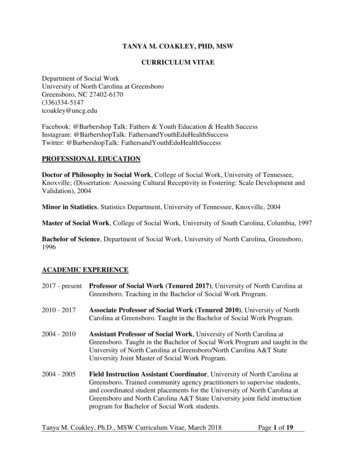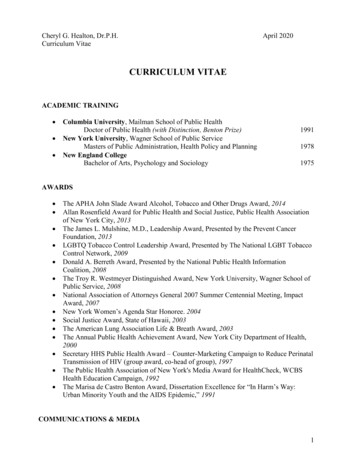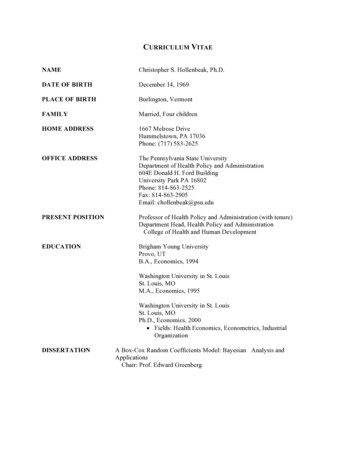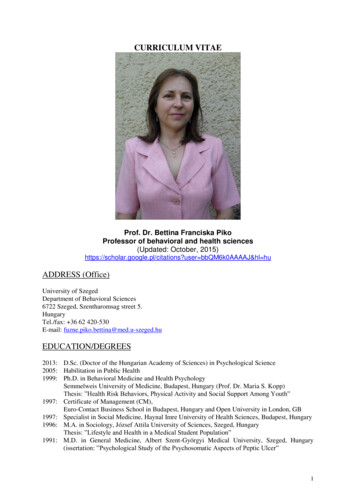
Transcription
CURRICULUM VITAEProf. Dr. Bettina Franciska PikoProfessor of behavioral and health sciences(Updated: October, 2015)https://scholar.google.pl/citations?user bbQM6k0AAAAJ&hl huADDRESS (Office)University of SzegedDepartment of Behavioral Sciences6722 Szeged, Szentharomsag street 5.HungaryTel./fax: 36 62 420-530E-mail: S2013: D.Sc. (Doctor of the Hungarian Academy of Sciences) in Psychological Science2005: Habilitation in Public Health1999: Ph.D. in Behavioral Medicine and Health PsychologySemmelweis University of Medicine, Budapest, Hungary (Prof. Dr. Maria S. Kopp)Thesis: ”Health Risk Behaviors, Physical Activity and Social Support Among Youth”1997: Certificate of Management (CM),Euro-Contact Business School in Budapest, Hungary and Open University in London, GB1997: Specialist in Social Medicine, Haynal Imre University of Health Sciences, Budapest, Hungary1996: M.A. in Sociology, József Attila University of Sciences, Szeged, HungaryThesis: ”Lifestyle and Health in a Medical Student Population”1991: M.D. in General Medicine, Albert Szent-Györgyi Medical University, Szeged, Hungary(issertation: ”Psychological Study of the Psychosomatic Aspects of Peptic Ulcer”1
POSITIONS:2015-:2004-2015:2001-2004:Full ProfessorAssociate ProfessorDepartment of Behavioral Sciences,Albert Szent-Györgyi Medical Center, University of SzegedBolyai Research Fellow, Hungarian Academy of Sciences2000, Fall Quarter:Visiting Research Professor,Department of SociologyThe University of Alabama at Birmingham, USA1999 -2001:Senior Lecturer,Department of Psychiatry, Division of Behavioral Sciences,Albert Szent-Györgyi Medical Center, University of SzegedAssistant Professor,Department of Public Health,Albert Szent-Györgyi Medical University of Szeged, HungaryResearch Fellow and Resident in Social Medicine,Department of Public Health,Albert Szent-Györgyi Medical University of Szeged, HungaryInstructor,Department of Public HealthAlbert Szent-Györgyi Medical University of Szeged, Hungary1995-99:1991-95:1990-91:PROFESSIONAL ACTIVITIES:MEMBERSHIP OF SCIENTIFIC ASSOCIATIONS:NETT (Hungarian Public Health Association), 1992- (founding member)EUPHA (European Public Health Association), 1992 (founding member)ESHMS (European Society of Health and Medical Sociology) (1999-) member of theExecutive Committee (2002)Hungarian Sociological Association (1996-)Hungarian Association of Addictions (1996-)Selye János Hungarian Society of Behavioral Medicine and Behavioral Sciences(1999)Hungarian Medical ChamberESA (European Sociological Association)STAR (Stress and Anxiety Research Society)EHPS (European Health Psychology Society, ND, National Delegate for Hungary,2002-)MEMBERSHIP OF EDITORIAL BOARD:Mentálhigiéné és Pszichoszomatika (Hungarian Journal of Mental Health andPsychosomatics)Kapocs (Social Relationships)Depression Research and TreatmentWest Indian Medical JournalJournal of Behavioral Addictions2
REVIEWING ACTIVITIES:Addictive BehaviorsAddictologia HungaricaAlkalmazott PszichológiaBMC Public HealthCollegium Anthropologicum (Croatia)Geographia MedicaHealth Education ResearchIdeggyógyászati SzemleIndian Journal of Medical SciencesInternational Journal of Nursing StudiesInternational Journal of Public HealthJournal of Adolescent HealthJournal of Early AdolescenceJournal of Happiness StudiesJournal of Happiness StudiesJournal of Postgraduate MedicineJournal of Studies on Alcohol and DrugsLege Artis MedicinaeMagyar Pedagógiai SzemleMagyar Pszichológiai SzemleMentálhigiéne és PszichoszomatikaOrvosi HetilapPersonality and Individual DifferencesPLOS OnePreventive MedicinePsychology and HealthScandinavian Journal of PsychologySocial Behavior and PersonalitySocial Science and MedicineSociological ReviewSzociológiai SzemleWest Indian Medical JournalEXPERT ACTIVITIES:2000-: Ministry of Education, reviewer for applications of textbooks in higher education2001: Foundation of National Social Science Research (OKTK), reviewer for researchapplications2003-: Research Ethics Committee, Hungarian Ministry of Health Care (ETT), 20032002-: National Fund of Research Development (NKFP), Young Scientists’ Conference(TDK), Faculty of Medicine, 2003-RESEARCH FIELDS:Leader of the Youth Research Group, Department of Behavioral Sciences, Universityof Szeged: http://www.szote.u-szeged.hu/magtud/piko/1., Adolescent problem behavior, risk and protective factors2., Social relationships, social support, coping and health3., Psychosocial health and substance use among youth3
4., Psychosocial work environment, job satisfaction, burnout and health5. Social inequalities in health6. Psychological and behavioral epidemiologyRESEARCH PROJECTS:- Youth Study at the Southern Plain: lifestyle, leisure activities, value orientations and health riskbehaviors (2003-2006, OTKA T 042490, principal investigator, 10.000 USD)- Behavioral science approach to health risk behaviors, health consciousness and mental health amongyouth at the Southern Plain (2003-2005, ETT T8 005, principal investigator, 10.000 USD)- The role of family and peers in adolescents’ view of health (2002, principal investigator, OKTKB.1915/V/02, 3.400 )- Behavioral Epidemiological Study among Adolescents: the role of knowledge, attitudes and skills inprimary prevention (2000-2002, principal investigator, ETT T9 003/2000, Research Project supportedby the Ministry of Health Care, 5.400 )- Adolescents’ Lifestyle and Health Risk Behavior Survey (2000-, principal investigator)- Behavioral Science Approach to the Nursing Profession: Job Satisfaction, Stress, Social Prestige(1998-2001, OTKA F 025070. Project supported by the National Research Fund, principalinvestigator, 4.200 )- Study of Health Risk Behavior of Adolescents in the Frame or Social Support (1995-1998, OTKA F017968. Project supported by the National Research Fund, principal investigator, 3.200 )- Patient Satisfaction Survey (1993-1996, ETT Research Project supported by the Ministry ofWelfare, member of the research team)- Self-Perceived Health among Managers (1993-1996, member of the research team)- Smoking or Health? Investigation of Smoking Behavior and Attitudes among Medical Students(1993-1996, member of the research team)- Health State and Health Behavior of a Medical Student Population (1992-1995, principalinvestigator)STUDY TOURS ABROAD:2000: The University of Alabama at Birmingham, USA, Department of Sociology(Eötvös Fellowship, Ministry of Education, Hungary and School of Social and BehavioralSciences, UAB, Birmingham, USA)1994: University Medical School of Amsterdam, the Netherlands,Institute of Social Medicine (TEMPUS Project)1994: Manchester Metropolitan University, Crewe Alsager Faculty, Alsager, England(Know How Academic Links Project, British Council)1993: London School of Hygiene and Tropical Medicine,Department of Health Services Research, London, England (TEMPUS Project)1992: Erasmus University, Rotterdam, the Netherlands,Department of Epidemiology (TEMPUS Project)1992: University Medical School of Amsterdam, the Netherlands,Institute of Social Medicine (TEMPUS Project)1988: Ernst-Moritz-Arndt Universität, Department of Internal Medicine,Greifswald, Germany (Student Exchange Programme)COURSES TAUGHT:University of Szeged, Faculty of Medicine:1991-93: Social Medicine: 1-semester course for 4th-year medical students1993-98: Epidemiology: 1-semester course for 4th-year medical students4
1993-: Medical Sociology: 1-semester course for 2nd year medical students1993-: Introduction to Preventive Medicine: 1-semester course for 1st year medical students1998-: Medical Anthropology: 1-semester course for 2nd year medical students1999-: Introduction to Medicine: 1-semester course for 1st year medical students2005-: Mental Health Promotion2005-: Behavioral Science Approach to AddictionsUniversity of Szeged, Faculty of Arts, Department of Sociology:1998-99: The Practice of Social Research: 2-semester course for 4th year students1999-: Sociology of Health and Medicine: 2-semester course for 3th year students2001-: Sociology of Deviant Behavior: 1-semester course2003-: Culture, society and psychology: 1-semester courseUniversity of Alabama at Birmingham (UAB), USA, Department of Sociology:2000: Sociology of Health and Health Care in Hungary and Eastern Europe: graduate courseDoctoral level:Semmelweis University, Budapest, Mental health science program: tutor in PhD program ”BehavioralSciences” (2003-)University of Szeged, Pedagogical science program: tutor in PhD program ”Health Education” (2008)University of Szeged, Pedagogical science program, PhD course (2009-): Positive psychologyapproach to school mental health promotion.http://www.doktori.hu/index.php?menuid 192&sz ID 880&lang ENAWARDS:1994: Vilmon Gyula Award for a publication in Health Education(Title: „The Role of Pharmacists in Health Education”, co-authored by Fodor T.)1995: Szeged Academic Committee Award for Research Activity(Title: „Lifestyle and Health in a Medical Student Population”)1999: Vilmon Gyula Award for a publication in Health Education(Title: „The Role of Pharmacists in Health Education in the frame of the professionalchanges”, co-authored by Dufka I.)2001-2004: Bolyai Research Fellowship, Hungarian Academy of Sciences2002: Foundation for Hugher Education and Research, Grant for publishing PhDdissertation2006: “ELIGE VITAM” Award for activity in drug abuse prevention (Ministry of SocialWelfare) June 26, 2006. 20/121/2006.2009: Top 10 cited papers (2006-2008) published in International Journal ofNursing Studies: Piko B.: Burnout, role conflict, job satisfaction andpsychosocial health among Hungarian health care staff: A questionnairesurvey. International Journal of Nursing Studies, Volume 43, Issue 3 (2006),pages 311-318.5
PUBLICATIONS IN ENGLISHBOOK CHAPTERS:Piko, B.F. (2002). Health Behavior and Psychosocial Health as a Health Policy Issue forYouth and Adolescence. In.: Mary N. Smyth (ed.): Health Care in Transition.Vol.1. NovaScience Publishers, New York. pp. 15-28.Piko, B.F. (2003). Hungary. In: D’Avanzo, Carolyn, E. (ed.): Pocket guide to culturalassessment. 3rd edition. Mosby, Philadelphia. pp. 337-342.Piko B.F., Fitzpatrick, K.M. (2006): Cross-cultural parent-child relations: The role of parentalmonitoring in youth’s substance abuse behaviors in Hungary and the United States. In:Dorothy M. Devore (eds.): New development in parent-child relations. Nova SciencePublishers, New York, pp. 15-28.Piko B., Piczil M. (2007). The role of psychosocial work environment in psychological healthand well-being among health care staff. In: Ina M. Pearle (eds.): Industrial PsychologyResearch Trends. Nova Science Publisher, New York, pp. 89-103.Piko B., Pluhár Zs., Keresztes N. (2007): Psychology of motivation of early adolescents’sports activity. In: Liam A. Chiang (eds.): Motivation of exercise and physical activity. NovaScience Publisher, New York, pp. 53-66.Piko B., Keresztes N. (2007): The role of social coping mechanisms in adolescent healthbehavior. In: Terry C. Rhodes (eds.): Focus on adolescent behavior research. Nova SciencePublisher, New York, pp. 157-170.Keresztes N., Piko B. (2008). Early adolescent girls’ psychosocial health in the light of theirsports activity behavior. In: Janet P. Coulter (ed.): Progress in exercise and women’s healthresearch. NOVA Science Publishers, New York, pp. 255-269.Piko B. (2008). “Do you really need to smoke?” Smoking and psychosocial health amongadolescents. In: Martin M. Lapointe (ed.): Adolescent smoking and health research. NOVAScience Publishers, New York, pp. 225-242.Bettina F. Piko, Maria S. Kopp (2008). Behavioural sciences in the health field: Integratingnatural and social sciences. In: Gertrude Hirsch Hadorn, Holger Hoffmann-Riem, SusetteBiber-Klemm, Walter Grossenbacher-Mansuy, Dominique Joye, Christian Pohl, UrsWiesmann, Elisabeth Zemp (eds.): Handbook of transdisciplinary research. Springer, pp. 305314.Brassai L., Piko B. (2009). The role of parent-adolescent connection in child welfare: A studyof high school students in Transylvania, Romania. In: Steven J. Quintero (ed.): Child welfareissues and perspectives. NOVA Science Publishers, New York, pp. 55-76.Luczczynska, Aleksandra, Piko, Bettina, Januszevicz, Anna (2011): Self-efficacy andadolescents’ health. In: Roger J.R. Levesque (ed.): Encyclopedia of adolescence. Springer,New York, pp. 2559-2566. ISBN: 978 – 1 – 4419 – 1694 – 56
Prievar,a Dóra Katalin, Piko, Bettina (2015): Escaping into the cyberspace: The correlationsbetween perceived stress and problematic internet use among Hungarian youth. In: KathleenA. Moore, Siobhán Howard and Petra Buchwald (eds): Stress and Anxiety: Applications toSchools, Well-Being, Coping and Internet Use. Berlin: Logos Verlag, 2015. pp. 178-185.PAPERS:Piko B., Barabás K., Markos J. (1996). Health Risk Behaviour of a Medical StudentPopulation. Report on a Pilot Study. Journal of the Royal Society of Health 116: 97-100.Piko B., Barabás K., Boda K. (1997). Frequency of common psychosomatic symptoms and itsinfluence on self-perceived health in a Hungarian student population. European Journal ofPublic Health 7: 243-247.Piko B. (1998). Social support and health in adolescence: A factor analytical study. BritishJournal of Health Psychology 3: 333-344.Piko B. (1999). Teaching the mental and social aspects of medicine in Eastern Europe: Roleof the WHO definition of health. Administration and Policy in Mental Health 26(6): 435-438.Piko B. (1999). Work-related stress among nurses: a challenge for health care institutions. TheJournal of The Royal Society of Health 119(3): 156-162.Piko B. (2000). Job satisfaction and dissatisfaction in Hungary: Nurses’ opinion of theirprofession in a changing society. Journal of Nursing Administration 30(10): 452, 473.Piko B. (2000). Health-related predictors of self-perceived health in a student population: theimportance of physical activity. Journal of Community Health 25(2): 125-137.Piko B. (2000). Perceived social support from parents and peers: which is the strongerpredictor of adolescent substance use? Substance Use and Misuse 35(4): 617-630.Piko, B.F. (2001). Beyond Biomedicine: The challenge of teaching preventive medicine.Medical Education 35(8): 808-809.Piko, B., Fitzpatrick, K.M. (2001) Does class matter? SES and psychosocial health amongHungarian adolescents. Social Science and Medicine 53(6): 817-830.Piko B. (2001). Gender differences and similarities in adolescents’ ways of coping.Psychological Record 51(2): 223-235.Piko B. (2001). Smoking in adolescence: Do attitudes matter? Addictive Behaviors 26(2):201-217.Piko B.F. (2002). Socio-cultural stress in modern societies and the myth of anxiety.Administration and Policy in Mental Health 29(3): 275-280.Piko B.F., Fitzpatrick, K.M. (2002). Without protection: Substance use among Hungarianadolescents in high-risk settings. Journal of Adolescent Health 30(6): 463-466.7
Piko B.F. (2002). Does knowledge count? Attitudes toward smoking among medical,pharmacy and nursing students. Journal of Community Health 27(4), 269-276.Piko BF., Kopp MS. (2002). Behavioral medicine in Hungary: Past, present and future.Behavioral Medicine, 28(2): 72-78.Piko B., Stempsey, W.E. (2002). Physicians of the future: Renaissance of polymaths? Journalof the Royal Society for the Promotion of Health, 122: 233-237.Piko B. (2003). Psychosocial work environment and psychosomatic health of nurses inHungary. Work & Stress, 17(1): 93-100.Piko B.F., Fitzpatrick, K.M. (2003). Depressive symptomatology among Hungarian youth: Arisk and protective factors approach. American Journal of Orthopsychiatry, 73(1): 44-54.Piko B (2004): Interplay between self and community: A role for health psychology in EasternEurope’s public health. Journal of Health Psychology, 9(1): 111-120.Piko, B., Fitzpatrick (2004). Substance use, religiosity and other protective factors amongHungarian adolescents. Addictive Behaviors, 29, 1095-1107.Luszczynska, A. Gibbons, F.X., Piko, B.F., Teközel, M. (2004). Self-regulatory cognitions,social comparison, and perceived peers’ behaviors as predictors of nutrition and physicalactivity: A comparison among adolescents in Hungary, Poland, Turkey, and USA. Psychologyand Health, 19(5): 577-593.Piko B.F., Vazsonyi A.T. (2004): Leisure activities and problem behaviours among Hungarianyouth. Journal of Adolescence, 27: 717-730.Piko, B., Piczil, M. (2004). Youth’s substance use and psychosocial well-being in Hungary’spost-socialist transition. Administration and Policy in Mental Health, 32(1): 63-71.Fitzpatrick, K.M., Piko, B.F., Wright, D.R., LaGory, M. (2005): Depressive symptomatology,exposure to violence, and the role of social capital among African American adolescents.American Journal of Orthopsychiatry, 75(2): 262-274.Piko B., Luszczynska, A. Gibbons, F.X., Teközel, M., (2005). A culture-based study ofpersonal and social influences of adolescent smoking. European Journal of Public Health,15(4): 393-398.Piko BF, Fitzpatrick, KM., Wright, D.R. (2005): A risk and protective factors framework forunderstanding youth’s externalizing problem behavior in two different cultural settings.European Child and Adolescent Psychiatry, 14(2): 95-103.Piko B. (2005): Adolescents’ health behaviors in the light of their value orientations.Substance Use and Misuse, 40(6): 735-742.8
Piko B.F. (2006). Adolescent smoking and drinking: The role of communal mastery and othersocial influences. Addictive Behaviors, 31(1): 102-114.Piko B. (2006): Burnout, role conflict, job satisfaction and psychosocial health amongHungarian health care staff. International Journal of Nursing Studies, 43, 311-318.Piko BF, Keresztes N, Pluhár Zs. (2006): Aggression and psychosocial health among children.Personality and Individual Differences, 40, 885-895.Piko B., Keresztes N. (2006): Physical activity, psychosocial health and life goals amongyouth. Journal of Community Health, 31(2), 136-145.Piko, B.F., Bak, J. (2006). Children’s perceptions of health and illness: Images and layconcepts in preadolescence. Health Education Research, 21(5), 643-653.Piko B. (2006). Satisfaction with life, psychosocial health, and materialism among Hungarianyouth. Journal of Health Psychology, 11(6), 827-831.Fitzpatrick, K.M. Dulin, A., Piko, B.F. (2007). ”Not just pushing and shoving”: Schoolbullying among African-American adolescents. Journal of School Health, 77, 16-22.Bak, J., Piko B. (2007). Smoke-free world for children’s welfare: Perceptions of smoking inpreadolescence. Children and Youth Services Review, 29: 283-293.Piko B. (2007): Self-perceived health among adolescents: The role of gender and psychosocialfactors. European Journal of Pediatrics, 166: 701-708.Piko, B.F., Fitzpatrick, K.M. (2007). Socioeconomic Status, Psychosocial Health and HealthBehaviors among Hungarian Adolescents. European Journal of Public Health, 17: 353-360.Piko, B.F. Bak, J., Gibbons, F.X. (2007). Prototype perception and smoking: Negative orpositive social images are more important in adolescence? Addictive Behaviors, 32: 17281732.Piko B. (2007): New challenges for mental health in public health. International Journal ofPublic Health, 52: 127-128.Piko B., Keresztes N. (2007). Self-perceived health among early adolescents: The role ofpsychosocial factors. Pediatrics International, 49(5): 577-583.Keresztes N., Piko B., Pluhar, Zs., Page, R.M. (2008). Social influences of leisure time sportsactivity among early adolescents. Journal of the Royal Society for the Promotion of Health,128(1): 21-25.Piko, B.F., Wills, T.A., Walker, C. (2007). Motives for smoking and drinking: Gender andcountry differences in samples of Hungarian and US high school students. AddictiveBehaviors, 32(10): 2087-2098.9
Keresztes N., Piko, B.F., Gibbons, F.X., Spielberger, C.A. (2009). The influence of socialpersonality variables on adolescents’ perceptions of sporting prototypes. PsychologicalRecord, 59(1), 39-52.Piko B., Gibbons F.X. (2008): Behavioral and psychosocial influences of risk perceptionamong Hungarian adolescents. International Journal of Public Health, 53, 131-138.Pluhár F. Zs., Kovács Sz., Piko B.F., Uzzoli A. (2009): ”Air pollution is bad to my health”:Knowledge of the role of environment in health and illness among 9-11-year-old children.Health & Place, 15, 239-246.Fitzpatrick, K.M., Piko, B.F., Miller, E. (2008): Suicide ideation and attempts among lowincome African American adolescents. Suicide and Life-Threatening Behavior, 38(5).Piko B., Keresztes N. (2008): Sociodemographic ancd socioeconomic variations in leisuretime physical activity in a sample of Hungarian youth. International Journal of Public Health,53, 306-310.Piko B. (2009): A new challenge: Depression is a significant problem among universitystudents. West Indian Medical Journal, 58(1), 1-2.Piko, B.F., Skulteti, D., Luszczynska, A., Gibbons, F.X. (2010): Social orientations andadolescent health behaviors in Hungary. International Journal of Psychology, 45(1), 12-20.Piko B., Kovács E., Fitzpatrick, K.M. (2009). What makes a difference? Understanding therole of protective factors in Hungarian adolescents’ depressive symptomatology. EuropeanChild and Adolescent Psychiatry, 18: 617-624.Piko, B.F., Brassai L. (2009): The role of individual and familial protective factors inadolescents’ poor diet control. Journal of Health Psychology, 14(6), 810-819.Fitzpatrick, K.M., Dulin, A., Piko, B. (2010): Bullying and depressive symptomatologyamong low-income, African-American youth. Journal of Youth and Adolescence, 39(6): 634645.Piko B.F., Kovács E. (2010): Do parents and school matter? Protective factors for adolescentsubstance use. Addictive Behaviors, 35, 53-56.Pluhár Zs., Piko B., Uzzoli A., Page, R.M., Dúll, A. (2010): Representations of physicalactivity in environment-related images of urban children in Hungary. Landscape and UrbanPlanning. 95, 151-160.Gerrits, J., O’Hara, R.O., Piko, B., Gibbons, F., de Ridder, D., Keresztes, N., Kamble, S.V.,de Witt, J. (2010): Self-control, diet concerns and eater prototypes influence fatty foodsconsumption of adolescents’ in three countries. Health Education Research, 25(6), 1031-1041.Piko B.F., Hamvai Cs. (2010): Parent, school and peer-related correlates of adolescents’ lifesatisfaction. Child and Youth Services Review, 32, 32, 1479-1482.10
Brassai, L. Piko, B.F., Steger, M.F. (2011). Meaning in life: Is it a protective factor foradolescents’ psychological health? International Journal of Behavioral Medicine, 18: 44-51.Page, R., Piko, B., Balazs, M., Struk, T. (2011): Social normative beliefs regarding cigarettesmoking in Hungarian adolescents. Pediatrics International, 53(3), 662-668.Kovacs E., Piko B., Fitzpatrick, K.M. (2011): Religiosity as a protective factor againstsubstance use among Hungarian high school students. Substance Use & Misuse, 46(10), 13461357Piko, B.F., Milin, R., O’Connor, R., Sawyer, M. (2011): Multidisciplinary approach to childand adolescent depression. Depression Research and Treatment, Article ID 854594,doi:10.1155/2011/854594Randy M. Page, Piko Bettina, Balázs Máté Ádám, Tamara Struk (2011): Media Literacy andCigarette Smoking in Hungarian Adolescents. Health Education Journal, 70(4), 446-457.Piko B., Balázs M.Á. (2012): Authoritative parenting style and adolescent smoking anddrinking. Addictive Behaviors, 37, 353-358.Piko B., Balázs M.Á. (2012): Control or involvement? Relationship between authoritativeparenting style and adolescent depression. European Child and Adolescent Psychiatry, 21,149-155.Mikulan R., Piko BF. (2012): High school students’ body weight control: Differences betweenathletes and non-athletes. Collegium Antropologicum, 36(1), 79-86.Piko, B., Kovács E., Kriston, P., Fitzpatrick, K.M. (2012): “To believe or not to believe?”Religiosity, spirituality and alcohol use among Hungarian adolescents”. Journal of Studies onAlcohol and Drugs, 73(4), 666-674.Brassai L., Piko, B.F., Steger, M.F (in press): Individual and Parental Factors Related toMeaning in Life among Hungarian Minority Adolescents from Romania International Journalof Psychology. [1.388]Brassai L., Piko, B.F., Steger, M.F. (in press): Existential attitudes and adolescents’ health andproblem behaviors: Highlighting role of the search for meaning in life. Psychological Record.[0.65]Varga Cs., Piko B. (2012): Population toxicology – An example of super-individual approachto human studies. World Environment, 2(4), 56-61.Brassai L., Piko, B.F., Steger, M.F. (2012): Existential attitudes and adolescents’ health andproblem behaviors: Highlighting role of the search for meaning in life. Psychological Record,62, 719-734.Piko, B.F., Brassai, L., Fitzpatrick, K.M. (2013): Social inequalities in self-perceived health:Comparing Hungarian and ethnic minority adolescents from Transylvania, Romania.European Journal of Mental Health, 8, 29-45.11
Fitzpatrick, Kevin M, Wendie Choudary, Anne Kearney, and Bettina Piko (2013): “Risk,Assets, and Health Behaviors Among Arkansas' Hispanic Adolescents.” Hispanic Journal ofBehavioral Sciences, 35(3): 428 – 447.Brassai L., Piko, B.F., Steger, M.F (2013): Individual and Parental Factors Related toMeaning in Life among Hungarian Minority Adolescents from Romania. International Journalof Psychology, 48(3): 308-315.Piko, B.F., Luszczynska, A., Fitzpatrick, K.M. (2013): Social support, optimism and socialinequalities in adolescent health. International Journal of Social Psychiatry, 59(5), 474-481.Piko, B, Pinczés, T. (2014): Impulsivity, depression and aggression among adolescents.Personality and Individual Differences, 69, 33-37.Kovács E., Keresztes N., Piko B. (2014): The interacting role of physical activity and dietcontrol in Hungarian adolescents’ substance use and psychological health. Substance Use andMisuse, 49(10), 1278-1286.Varga Sz., Piko, B., Fitzpatrick, K.M. (2014): Socioeconomic inequalities in mental wellbeing among Hungarian adolescents: a cross-sectional study. International Journal of Equity inHealth., 28; 13(1): 100.Brassai L., Piko B., Steger, M.F. (2015): A reason to stay healthy: The role of well-being,value on health, and meaning in life in adolescents’ health behavior. Journal of HealthPsychology, 20(5), 473-482.Keresztes, N., Piko, B., Fülöp, M. (2015): Does competitiveness count? The role ofcompetitive attitudes in health risk and preventive health behaviors. European Journal ofMental Health, 10, 44-61.Piko, B., Pinczés, T. (2015): Autonomy support or control? High school students’ experienceof their teacher’s behavior: European Journal of Mental Health, 10, 106-117.Piko, B., Varga, Sz., Wills, T.A. (2015): A study of motives for tobacco and alcohol useamong high school students in Hungary. Journal of Community Health, 40, 744-749.12
monitoring in y RXWK¶V substance abuse behaviors in Hungary and the United States. In: Dorothy M. Devore (eds.): New development in parent-child relations. Nova Science Publishers, New York, pp. 15-28. Piko B., Piczil M. (2007). The role of psychosocial work environment in psychological health

